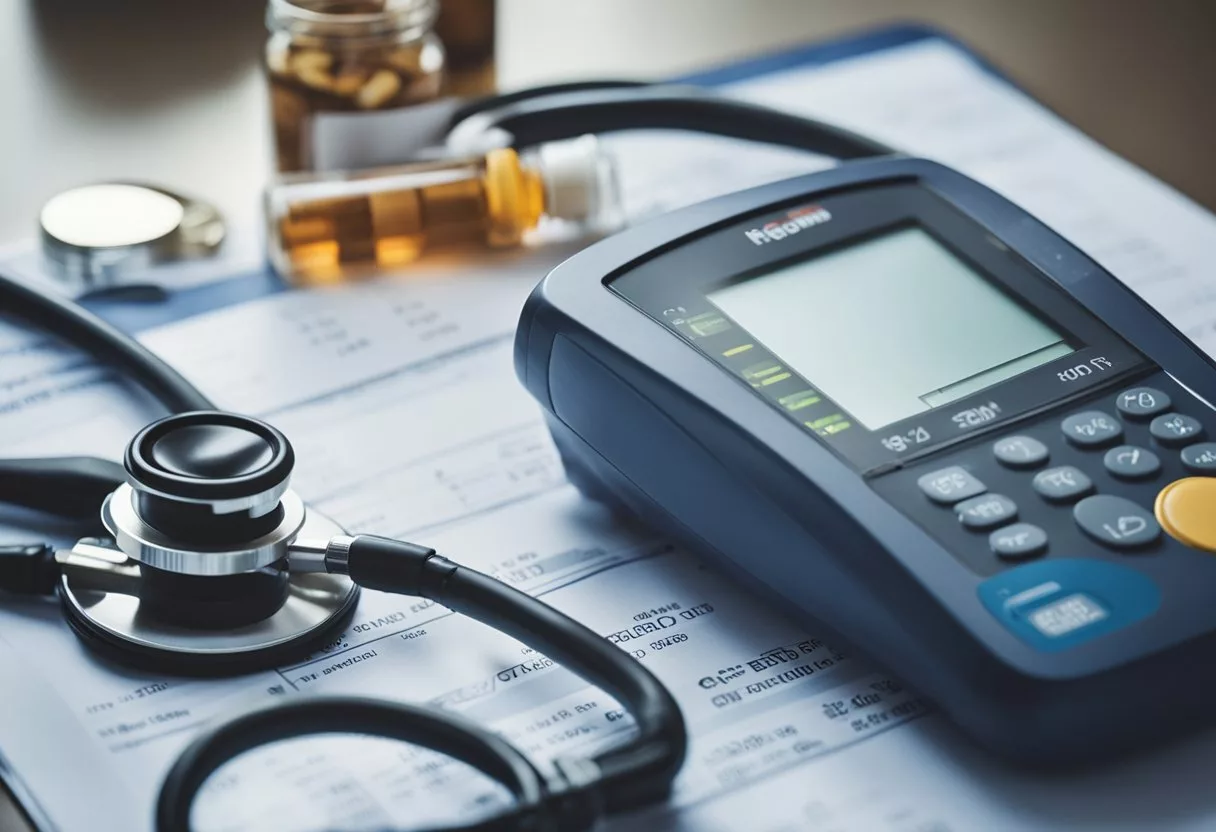Maintaining cardiovascular health is crucial, especially when managing heart disease. Medications play a vital role in treating various cardiovascular conditions, such as high blood pressure, heart failure, and high cholesterol. These medications can alleviate symptoms and improve the quality of life for individuals with heart disease.

Various classes of heart medications are available today. Many of these medications aim to reduce the heart’s workload and improve its efficiency. For instance, statins help lower LDL cholesterol, while ACE inhibitors and angiotensin II receptor blockers widen blood vessels to lower blood pressure.
Patients may also be prescribed other medications like anticoagulants and beta-blockers. These treatments are selected based on the individual’s specific health needs and conditions. Understanding the use and purpose of these medications can lead to better management of heart health and overall well-being.
Key Takeaways
- Medications are essential in managing cardiovascular diseases.
- Different classes target specific heart health issues, like blood pressure and cholesterol.
- Proper medication use can improve symptoms and enhance quality of life.
Understanding Cardiovascular Diseases

Cardiovascular diseases affect the heart and blood vessels, leading to severe health issues if not managed properly. This section discusses the different types of heart diseases, along with their symptoms and methods of diagnosis.
Types of Heart Diseases
There are several types of heart diseases. Heart failure happens when the heart cannot pump blood efficiently. Symptoms might include shortness of breath and fatigue. Angina is chest pain caused by reduced blood flow to the heart. This pain may feel like pressure or squeezing in the chest. Atrial fibrillation (AFib) is a type of irregular heartbeat that can lead to blood clots, stroke, or heart failure. Strokes occur when the blood supply to part of the brain is interrupted, leading to potential brain damage. Each type of heart disease requires specific medications and lifestyle changes for management.
Symptoms and Diagnosis
Symptoms vary based on the type of heart disease. Common symptoms include chest pain, shortness of breath, and palpitations. In the case of heart failure, symptoms also include swelling in the legs and abdomen due to fluid retention. Diagnosis typically involves a combination of methods. Doctors may use electrocardiograms (EKG) to detect irregular heart rhythms and echocardiograms to view the heart’s structure and function. Blood tests can help identify markers of heart disease, such as high levels of cholesterol or inflammation. Some cases may require further imaging, like an angiogram, to visualize blockages in the coronary arteries.
Understanding cardiovascular diseases involves recognizing their varied forms and the importance of early detection and treatment. Early intervention can significantly improve prognosis and quality of life.
Assessment and Monitoring

Accurate monitoring is vital in managing cardiovascular health. It involves tracking key indicators like blood pressure and cholesterol levels to prevent or manage conditions like high blood pressure and heart disease.
Blood Pressure Tracking
Measuring blood pressure regularly helps detect and manage high blood pressure effectively. Blood pressure is typically measured using a sphygmomanometer, which gives readings in millimeters of mercury (mm Hg). The two numbers in a reading represent systolic and diastolic pressures.
- Systolic Pressure: The first number, indicating the pressure in the arteries when the heart beats.
- Diastolic Pressure: The second number, indicating the pressure in the arteries when the heart rests between beats.
High blood pressure is defined as readings consistently at or above 130/80 mm Hg. Regular tracking can help determine if lifestyle changes or medications are needed. Keeping a log of blood pressure readings can help healthcare providers adjust treatments and prevent complications.
Blood Tests and Cholesterol Levels
Blood tests are essential in assessing cardiovascular risk, particularly cholesterol levels. Cholesterol is a fatty substance in the blood, essential for building cells but can be harmful in excess.
- Total Cholesterol: This test measures the overall amount of cholesterol in the blood, including LDL and HDL cholesterol.
- LDL Cholesterol: Often called “bad” cholesterol, high levels of LDL can lead to plaque buildup in arteries, increasing the risk of heart disease.
- HDL Cholesterol: Known as “good” cholesterol, HDL helps remove LDL cholesterol from the bloodstream.
Doctors may also check triglycerides, another type of fat in the blood. A fasting blood test usually provides the most accurate measurement. Regular testing helps track these levels and manage them through diet, exercise, or medications.
Regular assessment and monitoring of these key indicators are crucial in maintaining cardiovascular health and preventing complications.
Pharmacologic Interventions

Pharmacologic interventions play a significant role in managing cardiovascular health. They include first-line medications commonly prescribed for initial treatment and alternative or combination therapies used for more complex cases.
First-Line Medications
Thiazide diuretics were the first class of drugs studied for treating hypertension. They help remove excess sodium and water from the body, lowering blood pressure. Angiotensin-converting enzyme (ACE) inhibitors like lisinopril relax blood vessels and reduce the workload on the heart. Beta-blockers, such as metoprolol, decrease heart rate and the force of heartbeats.
Other commonly prescribed first-line medications are calcium channel blockers and angiotensin II receptor blockers (ARBs). These medications help widen blood vessels and improve blood flow. First-line medications are often chosen for their efficacy and relatively favorable side effect profiles.
Alternative and Combination Therapies
When first-line medications are not enough, doctors may prescribe alternative therapies or combinations. Aldosterone antagonists and direct renin inhibitors can be considered, especially in patients with resistant hypertension. Combination therapy often involves two or more medications from different classes, enhancing the overall blood pressure-lowering effect.
For instance, combining a diuretic with a calcium channel blocker or an ACE inhibitor can provide better control than using a single drug. These combinations are often more effective in managing patients with multiple cardiovascular risk factors. By tailoring treatments to individual needs, healthcare providers aim to achieve optimal outcomes.
Classes of Cardiovascular Medications

Cardiovascular medications include drugs for lowering blood pressure, managing cholesterol, preventing blood clots, and treating heart failure. Each class of medication works differently to help maintain heart health.
Antihypertensives
Antihypertensives help lower high blood pressure. There are several types:
- ACE Inhibitors: These drugs, such as enalapril and lisinopril, relax blood vessels by blocking the enzyme that narrows blood vessels.
- ARBs: Angiotensin II Receptor Blockers (like losartan) also relax vessels, but they block the action of angiotensin II directly.
- Beta Blockers: Medications like metoprolol reduce heart rate and the heart’s workload.
- Calcium Channel Blockers: Drugs such as amlodipine prevent calcium from entering heart and blood vessel cells, relaxing them.
- Diuretics: Sometimes called “water pills,” like furosemide, they help remove excess sodium and water to reduce blood pressure.
Statins and Cholesterol Modulation
Statins are the primary treatment for lowering LDL cholesterol. They block a substance the body needs to make cholesterol.
- Statins: Examples include atorvastatin and simvastatin. These drugs lower LDL cholesterol and reduce the risk of heart attacks.
- Other Cholesterol Modulators: Ezetimibe reduces the amount of cholesterol absorbed from food. PCSK9 inhibitors like alirocumab lower cholesterol by targeting specific proteins that impact LDL levels.
Regular use of these drugs helps maintain healthier cholesterol levels and can prevent heart disease.
Anticoagulants and Antiplatelets
These medications prevent blood clots, reducing the risk of strokes and heart attacks.
- Anticoagulants: Drugs such as warfarin and newer agents like rivaroxaban work by lengthening the time it takes for blood to clot. They are often referred to as “blood thinners.”
- Antiplatelet Drugs: Aspirin and clopidogrel prevent platelets in the blood from sticking together, making it harder for clots to form.
Both types of drugs are crucial for patients with conditions like atrial fibrillation or those who’ve had heart valve surgeries.
Heart Failure Medications
Various medications are used to treat heart failure by improving heart function and alleviating symptoms.
- Beta Blockers: They not only lower blood pressure but also improve heart function over time.
- ACE Inhibitors and ARBs: Both classes decrease blood pressure and reduce strain on the heart.
- Diuretics: These medications help reduce fluid buildup in the body, which is common in heart failure patients.
- Nitrates: They help ease chest pain by dilating blood vessels, improving blood flow to the heart.
Patients with heart failure often take a combination of these medications to manage their condition effectively.
In-Depth Look at Antihypertensives

Antihypertensives are medications that help manage high blood pressure, which is a major risk factor for heart disease and stroke. They work through different mechanisms to lower blood pressure and protect cardiovascular health.
ACE Inhibitors and ARBs
ACE Inhibitors (Angiotensin-Converting Enzyme Inhibitors) help relax blood vessels by inhibiting the enzyme that produces angiotensin II, a substance that narrows blood vessels. Common ACE inhibitors include Benazepril, Captopril, Enalapril, Lisinopril, and Ramipril. These medications not only lower blood pressure but also reduce strain on the heart, aiding in the treatment of heart failure and preventing strokes.
ARBs (Angiotensin II Receptor Blockers), such as Valsartan and Losartan, also relax blood vessels but work by blocking the receptors that angiotensin II binds to. This prevents blood vessel constriction that leads to increased blood pressure. ARBs are often prescribed for patients who experience side effects from ACE inhibitors, such as a persistent dry cough.
Beta-Blockers and Diuretics
Beta-Blockers reduce blood pressure by slowing down the heart rate and decreasing the heart’s workload. They block the effects of adrenaline, helping the heart to beat more slowly and with less force. Popular beta-blockers include propranolol, atenolol, and metoprolol. These drugs are particularly useful for patients with arrhythmias or those who have suffered a heart attack.
Diuretics, sometimes called “water pills,” help the kidneys remove excess sodium and water from the body through urine. This reduces blood volume, leading to lower blood pressure. Common diuretics include thiazides, loop diuretics, and potassium-sparing diuretics. Combining diuretics with other antihypertensive drugs can enhance their effectiveness and manage conditions such as heart failure and edema.
Calcium Channel Blockers
Calcium Channel Blockers prevent calcium from entering the muscle cells of the heart and blood vessels. This relaxation of the blood vessels leads to lower blood pressure and improved blood flow. Common drugs in this class include amlodipine, verapamil, and diltiazem. These medications are especially beneficial for patients with specific conditions like angina or certain types of arrhythmias.
They not only lower blood pressure but also help reduce chest pain and control irregular heartbeats, enhancing overall cardiovascular health.
Anticoagulation Management

Managing anticoagulation is vital for preventing blood clots and reducing the risk of stroke, especially in patients with cardiovascular conditions. This includes using various medications such as Warfarin, newer agents like Apixaban, and antiplatelet therapies.
Warfarin and Newer Agents
Anticoagulants are used to prevent and treat blood clots.
Warfarin is one of the oldest and most well-known anticoagulants. It works by inhibiting Vitamin K. While effective, it requires regular blood monitoring through INR tests. Dietary changes can also affect its efficiency, which makes managing doses more challenging.
Newer anticoagulants like Apixaban (brand name Eliquis), Rivaroxaban, and Heparin have been developed. These do not require regular blood tests and have fewer dietary restrictions. Apixaban and Rivaroxaban are known as Direct Oral Anticoagulants (DOACs) and are used to treat conditions such as atrial fibrillation and deep vein thrombosis. They are popular because of their ease of use and predictable effects.
| Medication | Brand Name | Requires Monitoring | Dietary Restrictions |
|---|---|---|---|
| Warfarin | Coumadin | Yes | Yes |
| Apixaban | Eliquis | No | No |
| Rivaroxaban | Xarelto | No | No |
Antiplatelet Therapy
Antiplatelet medications help prevent blood clots by stopping platelets from clumping together.
Aspirin is a widely used antiplatelet medication. It is often prescribed for patients with heart disease to prevent heart attacks and strokes. It is inexpensive and easy to use. However, it can cause stomach issues in some people.
Other notable antiplatelet drugs include Clopidogrel and Ticagrelor. These are often used following a heart attack or stent placement. They work well in combination with anticoagulants for certain conditions, such as ischemic heart disease and acute coronary syndrome.
| Medication | Use Case | Common Side Effects |
|---|---|---|
| Aspirin | Heart disease, stroke prevention | Stomach issues |
| Clopidogrel | Post-heart attack, stent placement | Bleeding |
| Ticagrelor | Ischemic heart disease | Breathlessness, bleeding |
In summary, the judicious use of anticoagulants and antiplatelet therapy is crucial for effective cardiovascular health management.
Therapeutics for Heart Failure

Heart failure treatment involves various medications that improve the heart’s efficiency and reduce symptoms. Commonly used drugs include vasodilators, neprilysin inhibitors, and combination therapies.
Vasodilators and Their Role
Vasodilators help relax blood vessels, making it easier for the heart to pump blood. Angiotensin-converting enzyme (ACE) inhibitors and angiotensin II receptor blockers (ARBs) are common vasodilators. ACE inhibitors, such as lisinopril, lower blood pressure and reduce strain on the heart. ARBs like losartan are used if patients cannot tolerate ACE inhibitors. Another type of vasodilator includes nitrates, which are often combined with hydralazine to treat heart failure in African American patients.
These drugs improve symptoms and help prevent hospitalizations. Monitoring is essential as they can cause low blood pressure or high potassium levels. Patients should work with their healthcare providers to manage these potential side effects.
Neprilysin Inhibitors
Neprilysin inhibitors block the enzyme neprilysin, which breaks down beneficial peptides. Sacubitril/Valsartan (Entresto) is an angiotensin receptor-neprilysin inhibitor (ARNI). This combination drug not only relaxes blood vessels but also promotes sodium and water excretion.
Research shows Entresto is effective in reducing the risk of cardiovascular death and hospitalization in patients with heart failure with reduced ejection fraction (HFrEF). It provides superior benefits compared to traditional ACE inhibitors. Patients on Entresto need regular blood tests to monitor kidney function and potassium levels. Common side effects include low blood pressure, high potassium, and renal issues.
Combination Therapies
Combination therapies use multiple drug classes to target heart failure from different angles. Sacubitril/Valsartan combines neprilysin inhibition with ARB action for a comprehensive approach. Other combinations include beta-blockers and aldosterone antagonists.
Diuretics or “water pills”, like furosemide, are often part of combination therapy to reduce fluid buildup. Heart failure drug treatment often includes ACE inhibitors or ARBs, beta-blockers, and diuretics for symptom relief and improved survival. These therapies require careful coordination and monitoring to balance effectiveness and side effects.
Proper utilization of these combination therapies ensures optimized care for heart failure patients, helping to stabilize their condition and improve their quality of life.
Common Side Effects and Interactions

Using heart medications can come with various side effects and interactions. It’s important to be aware of these potential issues to manage them effectively and avoid complications.
Managing Side Effects
Dizziness or Lightheadedness: This is a common side effect of many heart medications. To manage it, patients should rise slowly from sitting or lying positions and avoid sudden movements. Eating small, frequent meals can also help stabilize blood pressure.
Coughing: ACE inhibitors, such as perindopril, may cause coughing. If persistent coughing occurs, individuals should consult their doctor. Changing the medication may be necessary to alleviate the symptom.
Gastrointestinal Issues: Some medications can cause stomach upset or nausea. Taking these medications with food or adjusting the dosage under a doctor’s guidance can minimize discomfort.
Fatigue: Certain heart medications can lead to tiredness. If this affects daily activities, discussing alternative treatments or dosage adjustments with a doctor is essential.
Interaction With Other Medicines
Blood Thinners and Pain Relievers: Some pain medications can affect the efficacy of blood thinners, increasing the risk of bleeding or clotting. Patients should consult their pharmacist before combining these drugs to prevent harmful interactions.
Antibiotics: Some antibiotics may interact with heart medications, causing undesirable effects like thickened blood. It’s vital to inform healthcare providers about all medications being taken.
Supplements: Vitamins and other supplements can interfere with heart medication dosages. For instance, vitamin supplements might disrupt a balanced medication regimen. Discussing supplement use with a healthcare provider ensures safe and effective treatment.
Cancer Drugs: Patients on cancer treatments should be particularly cautious, as studies have shown that 16% of those receiving oral anticancer drugs experience significant drug-drug interactions. Regular consultation with a healthcare provider is necessary to manage these risks effectively.
Patient-Centered Care

Patient-centered care is essential in cardiovascular health as it ensures that patients are active participants in their treatment. This approach emphasizes education, involvement, and consistent follow-up to manage and improve cardiovascular outcomes effectively.
Patient Education and Involvement
Patient education is crucial when managing cardiovascular diseases. Doctors and nurses should provide clear instructions about prescribed medications, explaining their benefits and potential side effects. This helps patients understand the importance of medication adherence and how it impacts their health.
Involving patients in their care also includes discussions about lifestyle changes. Dietary adjustments, regular exercise, and smoking cessation are key components. Health professionals should partner with patients to set realistic goals, fostering a collaborative relationship.
Additionally, patient-held alert cards and care plans can improve communication between patients and their healthcare teams, enhancing continuity and quality of care. For more on the significance of including patients in care plans, you can visit this article.
Post-Medication Follow-Up
Regular follow-up appointments are vital to monitor the effectiveness of prescribed medications and make necessary adjustments. These visits allow healthcare providers to assess how well patients are sticking to their medication regimen and address any challenges they face with medication adherence.
During follow-ups, ongoing education about managing cardiovascular disease is provided, emphasizing the importance of continuing medication even when symptoms improve. This is especially important for patients with chronic conditions like diabetes.
Behavioral health services can also be included in follow-up care, addressing related issues like stress and mental health, which can impact cardiovascular health. It’s crucial to maintain an open dialogue with patients to ensure their needs are being met and their treatment plan is effective. Further insights on the benefits of patient-centered follow-ups can be found here.
Innovations in Cardiovascular Medicine

Advancements in cardiovascular medicine have led to the development of new medications and surgical techniques that significantly improve patient outcomes. These innovations offer targeted treatments and less invasive options for managing heart disease.
Recent Developments in Medications
Significant progress has been made in developing medications that target cardiovascular health. Inclisiran is a promising new drug that lowers low-density lipoprotein cholesterol (LDL-C) with just two doses per year. This medication could be particularly beneficial for patients struggling with high cholesterol levels.
Another key development is the use of neprilysin inhibitors to treat heart failure. These inhibitors help to improve heart function and reduce hospitalizations for patients with heart failure. Diabetes drugs are also showing promise in heart health, offering benefits to people without diabetes by helping manage blood pressure and cholesterol levels.
Advances in Surgical Interventions
Surgical interventions in cardiology have seen remarkable innovations. New technologies allow for less invasive procedures, which can reduce recovery times and improve outcomes. For example, the use of stents and balloons in interventional cardiology has evolved. Modern stents are now used not only to keep arteries open but also to deliver medication directly to the site of blockage, enhancing their efficacy.
Techniques involving catheter-based heart valve replacements have also advanced. These procedures use a catheter to deliver a new valve to the heart, reducing the need for open-heart surgery. These innovations provide critical treatment options for patients who may not be candidates for traditional surgery.
For more details on these medications, refer to the Cleveland Clinic’s report. Additionally, newer technologies and medications discussed by the American Heart Association are also noteworthy and detailed here.
Frequently Asked Questions

This section addresses common queries about cardiovascular medications, including their functions, classifications, and the latest advancements.
What medications are commonly prescribed for heart attack prevention?
Doctors often prescribe beta-blockers, aspirin, and statins for heart attack prevention. Beta-blockers reduce heart rate and blood pressure. Aspirin prevents blood clots, while statins lower cholesterol levels.
How do drugs classified under cardiovascular pharmacology function?
Cardiovascular drugs work through various mechanisms. For instance, ACE inhibitors widen blood vessels and decrease blood pressure. Diuretics remove excess salt and water from the body, helping to reduce blood pressure and swelling.
Which medications are considered top treatments for cardiovascular diseases?
Key treatments include ACE inhibitors, beta-blockers, and statins. ACE inhibitors reduce blood pressure and improve heart function. Beta-blockers slow the heart rate, and statins lower cholesterol levels. Each medication addresses specific aspects of cardiovascular health.
What are the latest advancements in medication to strengthen heart muscle?
New medications aim to support heart muscle function. For example, Sacubitril/valsartan is used for heart failure, offering improved outcomes compared to traditional treatments. Research continues to develop drugs that enhance heart muscle efficiency and longevity.
How are heart medications categorized and what are the implications for treatment?
Heart medications are categorized by their functions. Categories include beta-blockers, calcium channel blockers, and diuretics. Beta-blockers manage heart rhythm, calcium channel blockers reduce blood pressure, and diuretics decrease fluid buildup. Each category targets specific aspects of heart health.
Can you list common cardiac drugs and their primary uses?
Common medications include beta-blockers like metoprolol, ACE inhibitors like lisinopril, and statins like atorvastatin. Metoprolol is used to manage high blood pressure and heart attacks. Lisinopril reduces blood pressure, while atorvastatin lowers cholesterol levels.